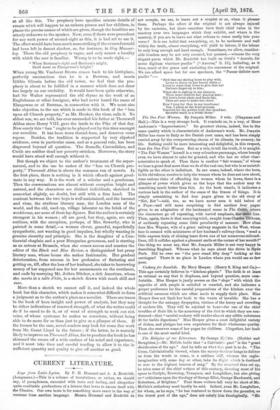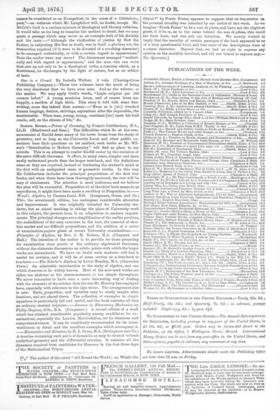The Religion of our Literature. By George MeCrie. (Hodder and
Stoughton.)—Mr. McCrie holds that "a Calvinistk poet" is the "great desideratum of the age." And he tells us what this poet is to do. "The Cross, Calvinistically viewed, where the surety-Saviour hangs to deliver us from the wrath to come, is a sublime cliff, whence the eagle- imagination will, some day or other, take its flight which is destined to soar to the highest heaven of song." By the standard thus set up, he tries some of the chief writers of this century, devoting most of his space to Carlyle, Browning, Tennyson, and Longfellow, but also giving us" criticisms upon the theology of George Eliot, George Macdonald, and Robertson, of Brighton." That these writers fall very far short of Mr. McCrie's orthodoxy need hardly be said. Indeed, even Mr. Longfellow, for whom, as he says, "he has ventured to throw down the gauntlet as the truest poet of the age," does not satisfy him theologically. "He cannot be considered as an Evangelical, in the sense of a Calvinistic, poet,"—an estimate which Mr. Longfellow will, no doubt, accept. Mr. McCrie's book is a curious mixture of theological and literary criticism. It would take us too long to examine his method in detail, but we may -quote a passage which may serve as an example both of his divinity and his taste :—" Although the vindication of justice by God the Father, in subjecting His Son to death, was in itself a glorious act, the transaction required (if it were to be diveated of a revolting character) to be managed mathetically, or with a certain regard to appearances." Does the reader want any more ? The Atonement managed "method- tally and with regard to appearances," and the man who can write that seta up not only to be a theological critic, a function which, as a Scotehman, he discharges by the light of nature, but as an arbiter of taste.



































 Previous page
Previous page